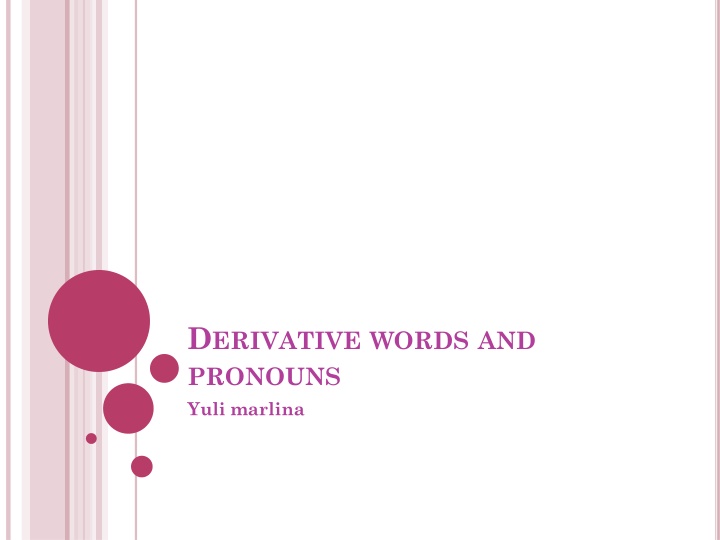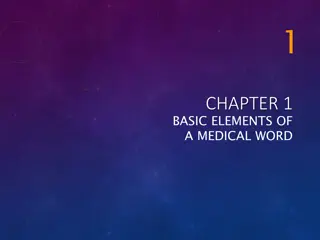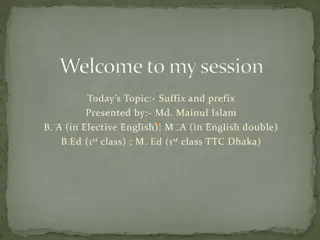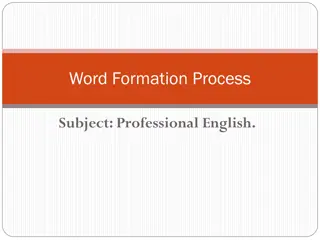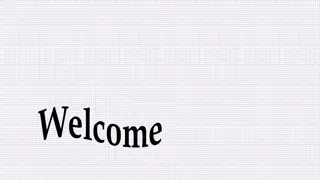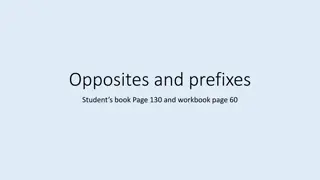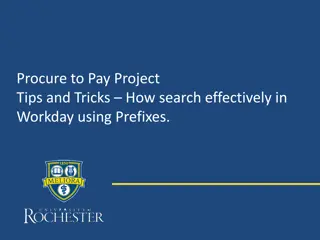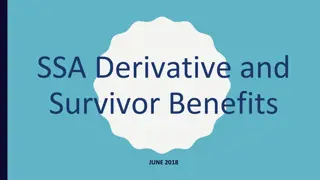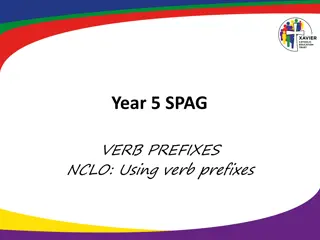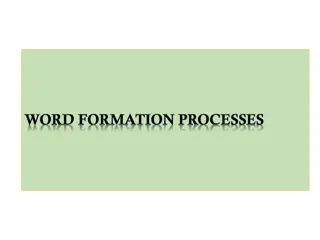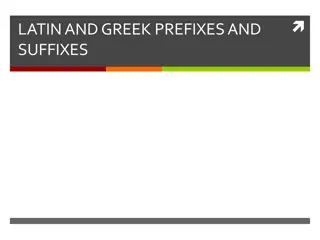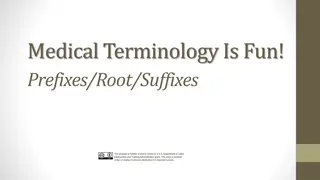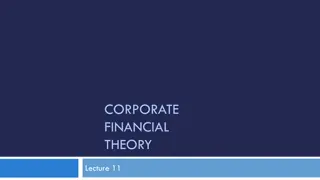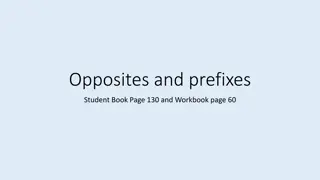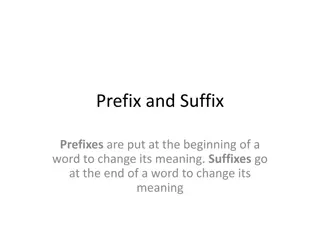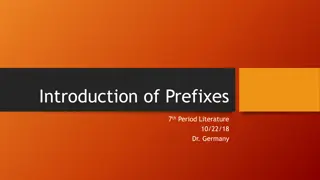Derivative Words and Prefixes in English Language
Delve into the world of derivative words, prefixes, and pronouns with insights on basic terms, the definition of prefixes, common prefixes in texts, prefixes' meanings and connotations, derivational suffixes, and a list of English words of Indonesian origin. Explore the modification and creation of words through affixes to enhance your English language skills.
Download Presentation

Please find below an Image/Link to download the presentation.
The content on the website is provided AS IS for your information and personal use only. It may not be sold, licensed, or shared on other websites without obtaining consent from the author.If you encounter any issues during the download, it is possible that the publisher has removed the file from their server.
You are allowed to download the files provided on this website for personal or commercial use, subject to the condition that they are used lawfully. All files are the property of their respective owners.
The content on the website is provided AS IS for your information and personal use only. It may not be sold, licensed, or shared on other websites without obtaining consent from the author.
E N D
Presentation Transcript
DERIVATIVE WORDS AND PRONOUNS Yuli marlina
BASIC TERMS root form: a word with no prefix or suffix added; may also be referred to as a base word inspector, thermal affix: meaningful part of a word attached before or after a root or base word to modify its meaning prefix: an affix which is placed before the stem of a word re-, un-, dis- suffix: an affix which is placed after the stem of a word -able, -ive, -ly derivation-a word formed from an existing word, root, or affix: electric, electricity
DEFINITION OF PREFIX A PREFIX IS PLACED AT THE BEGINNING OF A WORD TO MODIFY OR CHANGE ITS MEANING prefix meaning example a- also an- not, without atheist, anaemic a- to, towards aside, aback in the process of, in a particular state a-hunting, aglow a- of anew completely abashed
20 MOST FREQUENT PREFIXES IN TEXTS inedible (impotent, illegal, irresponsible) 1. unable 2. review enlighten (empowe r) submarin e inside, implant overcom e distrust nonsense misguide d prefix interrupt forewarn superson ic semicircl e derail transfer antitrust Analysis: White, Sowell, and Yanagihara 1989 midterm underfed
PREFIXES: MEANING AND CONNOTATION Often Negative Somewhat Positive dis-, de- in- pro- co- bene- non- sub- super- com- be- un- anti, contra mis- en-, em- mal- a- ad-
DERIVATIONAL SUFFIXES Derivational suffixes change the part of speech words ending with tion are often nouns words ending with ive are often adjectives words ending with ish are often adjectives words ending with ity are often nouns What about -ment, -ous, -ness?
LIST OF ENGLISH WORDS OF INDONESIAN ORIGIN Animals Food and fruits Plants and trees Babirusa Agar ,satay, tempeh bamboo Bantam Durian Pandanus Cassowary Mangos teen Rattan Cockatoo Rambutan Sago Dugong Salak Cajuput Gecko pangolin
PRONOUN A pronoun is a word we use to take the place of a noun, which can be a person, place or thing. We use it (pronoun) to avoid repeating a noun that had already been mentioned. Example; Jim has a bicycle. Jim rides his bicycle every day. .. ?
EXAMPLES OF PRONOUN ARE. I, you, he, she, it, we, they, anyone, everyone , himself, myself, nobody, yourself, who. this, that, all, any, each, none, some, that, w hat, which, This is a big house. (This is a pronoun as it occurs independently.) This house is big. (This comes after the noun house, so it is not a pronoun. Here, this is a determiner. A determiner modifies a noun, which a pronoun does not do.) Some of the students were rather skinny. (Pronoun) Some students were rather skinny. (Determiner)
1. PERSONAL PRONOUNS Personal pronouns take the place of nouns that refer to people, but not all personal pronouns refer to people. The third person pronoun it refers to animals and things. Personal pronouns have number, person, and gender. The Personal Pronoun must be of the same number, gender, and person as the noun for which it represents. Number: The pronoun must agree with the noun it represents in number. Singular: The boy is playing with his kite. He has a red kite. Plural: The boys are playing with their kites. They have kites of various colours. Person: First person: I hate clipping my nails. Second person: You should not have done it. Third person: It is a rare species of fish. Gender: The pronoun must agree with the noun it represents in gender. Masculine: Jill has a boyfriend. He comes across as a bit of a bore to her. Feminine: John s sister loves to eat pizza. She eats it almost every day. Neuter: We have an old kitchen table. It has a broken leg.
Singular Subject pronouns Plural Possessive pronouns Determiner I you he she it we you they they my your his her they our your their their Possessive pronouns Object pronouns me you him her it us you them them them mine yours his hers ours yours theirs theirs
2. REFLEXIVE PRONOUNS Reflexive pronouns are those pronouns formed by adding self to singular and selves to plural possessives to produce the following: myself, yourself, herself, himself, itself, oneself; and ourselves, yourselves, themselves. Reflexive Pronouns Singular Plural First person I : myself We : ourselves Second person You : yourself You : yourselves Third person He : himself They : themselves She : herself They : themselves It : itself They : themselves
EXAMPLE Sometimes I think to myself that it is time to lose some weight. She likes to look at the mirror and smile to herself. He tried to be himself and not be like Michael Jackson all the time
3. RELATIVE PRONOUNS A relative pronoun comes at the beginning of a relative clause. A relative clause is a subordinate clause that tells us more about the noun in the main clause. The relative clause comes immediately after the noun. The words of relative pronouns are.. that, which, who,whom, whose, whatever, whichever, whoever, whomever,
EXAMPLES That was the camera, which he bought. (Pronoun comes after which) The man is an artist. He drew those pictures. The man who drew those pictures is an artist The man whom they caught was sent to prison ( whom as the object of the verb) The man to whom you should speak is the manager. / The man whom you should speak to is the manager. ( when it comes after preposition)
4. POSSESSIVE PRONOUNS The possessive pronouns are the possessive forms of personal pronouns. We use the personal pronouns in the possessive case to express possession. A possessive pronoun is able to stand on its own as subject, object. Possessive pronouns Singular Plural mine yours his hers ours yours theirs theirs
5. DEMONSTRATIVE PRONOUNS The four common demonstrative pronouns are this, that, these, those. We use them to indicate the person, thing or place referred to Examples.. 1. Pronoun: This is the same story I heard from him before. 2. Pronoun: That is not a bird; it is a kite.
6. INDEFINITE PRONOUNS Indefinite pronouns refer to people or things in general, that is they do not specify a particular person or thing. all, another, anybody, anyone, anything, both, each, either, everybody, eve ryone, everything, few, little, nobody, no one, none, nothing, one, other, several, some , somebody, someone, something.
NEXT indefinite pronouns that refer to people are anybody, anyone, everybody ,nobody, one, somebody, etc., These pronouns ending in body and one are always singular as in the following examples. I heard a noise from the other room but there wasn't anybody there. Anyone is welcome to help wash my car. Everybody is waiting to hear the good news. Nobody wants to listen to my ghost stories.
NEXT Indefinite pronouns that refer to things such as anything, everything, nothing, something, etc. are singular He blames others whenever anything happens to him. She's pretty happy that everything is fine with her new job. I have already told you there is nothing wrong with me. There is something on your forehead.
NEXT. indefinite pronouns that are always plural include both, few, others and several. 1.I cannot forget those two fat monkeys, both of which were obviously overfed. 2.There are a few countries I would like to visit before I die. 3.One escaped prisoner was recaptured while two others were still at large. 4.Several of the crocodiles are believed to have escaped from the crocodile farm.
